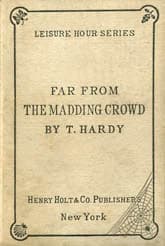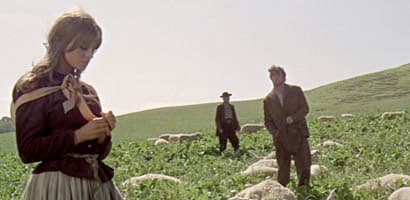Far from the Madding Crowd
Critique • Quotes • At the movies
 First U.S. edition, 1874
First U.S. edition, 1874First publication
1874, England
Literature form
Novel
Genre
Literary
Writing language
English
Author's country
England
Length
Approx. 154,000 words

Beautiful people—Julie Christie and Alan Bates—in Far from the Madding Crowd's beautiful countryside.
To love and die in Wessex
Far from the Madding Crowd (1967): Film, 169 minutes; director John Schlesinger; writ. Frederic Raphael; featuring Julie Christie, Terence Stamp, Alan Bates, Peter Finch
Thomas Hardy's first great novel, Far From the Madding Crowd, has been adapted for screen at least five times, including a silent film, a television series, a Japanese-language film and a videotaped staged production for young people.
The adaptation you are most likely to find and enjoy though is the 1967 movie directed by John Schlesinger (Midnight Cowboy), starring Julie Christie as Bathsheba Everdene, Alan Bates as her lowly would-be lover Gabriel Oak, Peter Finch as her landowning would-be lover Boldwood, and Terence Stamp as the dashing wastrel and her successful lover Sergeant Troy.
It's a very British production, moving in stately fashion through beautifully photographed (by Nicholas Roeg) country scenery and in sensitive fashion through all the ins and outs of the complex relationships. This makes for a slower-moving film, at nearly three hours long, more than many modern audiences like, but it's a near-perfect rendition of Hardy's novel.
Christie was a controversial choice for the female lead at the time and was criticized as being too sexy and too modern for the role. And it is true that at times her acting style (not to mention her hairstyle) seems more 1960s than early 1800s, and Schlesinger, who is said to have adored her, often has her shot in romantic soft focus that seems out of place for the rough farming locale. But Christie has a strong, lively and playful presence that makes us follow her every expression and makes plausible the attraction the stubborn and haughty Bathsheba had for the men she came in contact with.
Stamp, who incidentally had been a former real-life lover of Christie's, is sensational as the steely-eyed soldier. His wooing of Bathsheba with swordplay in the rolling fields has become recognized as a classic scene of implied eroticism. But even more impressive is how this character, seen by most everyone (excepting Bathsheba) as a self-centred nasty piece of work, is eventually brought low and even partly into our sympathy by remorse over the loss of another woman he had truly loved but treated badly.
Engaging our sympathy all the way though is Bates as the ever-suffering but always stalwart Oak (perfect name). It takes a good actor to keep Oak from being either too pathetic or too heroic, but always there to allow everyone else to shine. (Bates and Christie would reunite three years later as the similarly mismatched lovers in The Go-Between.)
Trailer for the 1967 adaptation of Hardy's Far from the Madding Crowd.
Another of those who shines is Finch as the gentleman farmer who obsesses over Bathsheba. I wish he had more screen time to really develop the character, leading up to that somewhat surprising action that changes the story's climax.
Schlesinger's film is lauded for being faithful to Hardy's novel and it is indeed a masterpiece of adaptation in that regard, so much so that I had to go back to the book afterward to try to find what story points had been changed in the interests of compression. (Quite a few, but intelligently so.)
A greater achievement, especially for Hardy readers, may be the film's faithfulness to rural Wessex, the author's semi-mythical imagining of England a few generations before his time. The people, their relations, the agriculture, the farms and roads, the folk celebrations, their songs....
Time is taken to get all the details of daily life just right to recreate the world in which the characters, and we the audience, live during the story.
Through all the good times and through all the disasters, both natural and human-made, we're at home there—inside a Hardy novel.
— Eric

